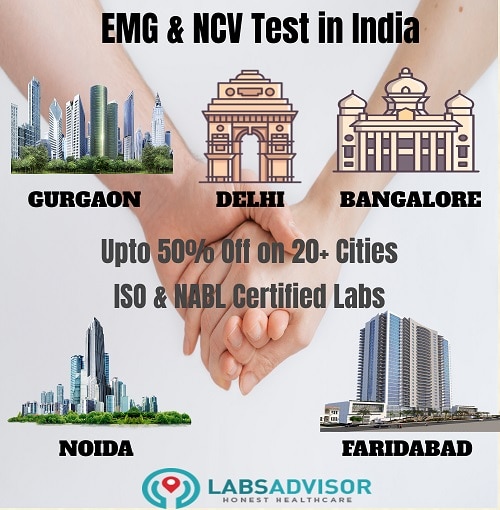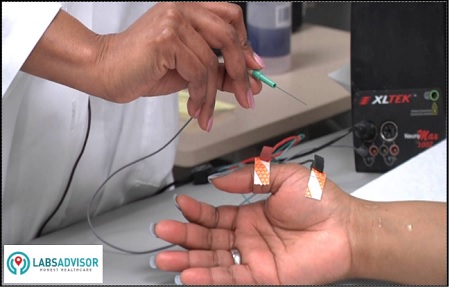
The full form of EMG is Electromyography.
An EMG test is a medical examination that measures the activity and health of our body muscles.
Book this really important test at your local top quality labs through us at up to 50% discount. The lowest EMG test cost is ₹1800 only.
EMG Test Through LabsAdvisor
|
Book online yourself at any time of the day or night by clicking on the appropriate link in the table below
EMG Test Cost in Different Cities
We offer the EMG & NCV test in over 20 Indian cities. Click on the link of your city below to choose a lab and make an online booking for home collection at a suitable time.

Frequently Asked Questions About EMG NCV Test
What is an EMG Test?
The full form of EMG is Electromyography.
An EMG test is a medical examination that measures the activity and health of our body muscles. When our muscles are active, they produce an electric current, which is generally proportional to the level of muscle activity.
This test is used to record this electrical activity in muscles and hence, aims to gather information about the human muscular and nervous systems.
It is a way of finding causes of muscle weakness or paralysis, and various other muscle troubles such as twitching, numbness, pain, injury or damage.
A doctor may prescribe an EMG Test for Neuropathy as well. Neuropathy is a term used to describe a problem with the nerves, very often the ‘Peripheral Nerves’ as opposed to the ‘Central Nervous System’.
One may also be prescribed an EMG test for Carpel Tunnel Syndrome, which essentially is a hand and arm condition which causes numbness and tingling sensations among other symptoms. Carpal tunnel syndrome is caused by a pinched nerve in the wrist.
How is EMG test done?
An EMG test can be performed at a doctor’s office, hospital or lab. The EMG procedure usually lasts from about thirty to sixty minutes, depending on the number of muscles to be tested.

During the procedure, a needle is inserted into the patient’s muscles through the skin. This is done to record the electrical activity in the muscles.
All of the recordings can be viewed on an oscilloscope or be heard by a speaker. Since our skeletal muscles are often large, numerous needle electrodes may be required at different locations on the body in order to obtain a comprehensive EMG test result.
You may be asked by your doctor or technician to contract the muscle during the examination. This is because the doctor will need to study your muscles when it’s resting, contracting slightly and contracting with a strong force.
The presence, size, and shape of the waveform produced on the oscilloscope with the contraction and rest give out information about the ability of our muscles to react to nervous stimulation.
Every muscle fiber produces an action potential for contraction. Its size affects the rate and size of the action potential.
If needed, the needle or electrodeposition might be changed to repeat the process.
At the same time of the EMG, you may also be required to take a Nerve Conduction Velocity test in order to negate any possibilities of nerve disorder or injury affecting the muscles.
For this, small electrodes will be taped to your skin or be placed around the fingers. During this entire test, you might feel an unpleasant tingling sensation in your body.
Does an EMG Test require any preparation?
Before taking an EMG, you will be asked by your doctor to take certain precautions. These may include not using any kind of body lotion for several hours before the examination and avoiding any kind of caffeine (tea, coffee, etc.) for three to four hours before the test.
Other than that, there is no special preparation required for adults. For infants and children, however, the physical and psychological preparation will depend upon the child’s age, behavior and prior experience (if any).
Make sure you disclose your entire medical history (including the current medication, if any) to your doctor before going in for the EMG Test.
Are there any side effects of an EMG test?
The EMG test when taken is safe with reliable test results. Therefore, side effects or infections because of the examination are rare.
However, in case there are any, symptoms may include increasing pain, redness on the skin, swelling, tenderness and/or yellowish-white puss. In case you encounter any of these symptoms, it is strongly recommended to consult your doctor.
You might feel slight discomfort or pain during the EMG testing when the needle electrodes are inserted. Pain after an EMG, in your muscles, is normal.
They might feel a little sore for a couple of days after the examination also. Additionally, you may witness small bruises on your body which might last for a week or more.
Also, before the testing, it is advisable to inform your doctor if you have a pacemaker, allergies or bleeding troubles.
What results can be expected after an EMG test?
The full report of a patient’s EMG test result may take 2-3 days. The results will be called normal when the EMG recording shows no electrical activity when the examined muscle is at rest.
It can be inferred from the smooth, wavy line on the recording. On the other hand, electrical activity in a muscle at rest may indicate that there is a problem with the nerve supply to the muscle.
The final diagnosis will eventually be a combination of your test report along with your medical history, symptoms, physical and neurological exams, etc.
Other topics you may be interested in:-







If your city is not listed in the table above, call us on +918061970525. We will get back to you with the price of an EMG test at your location.
Get the lowest price for your EMG test by calling us at
☏+918061970525
If you want us to call you back, click on the link below
Why trust LabsAdvisor for my scan?
The discounts on the EMG test are available only to those who made the booking through LabsAdvisor.com. You will be asked to pay the actual price if you do not carry the booking confirmation message sent by the LabsAdvisor.com